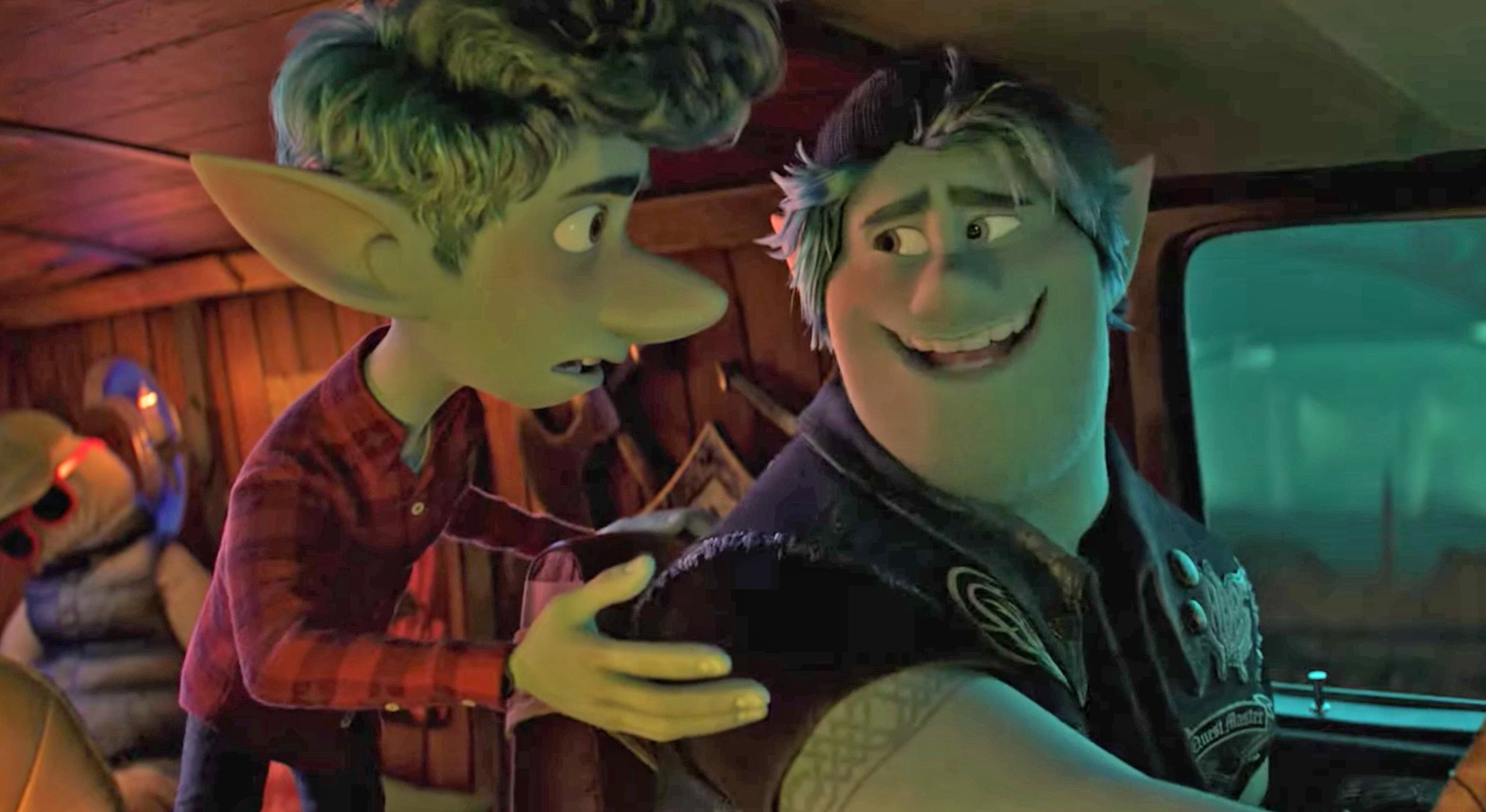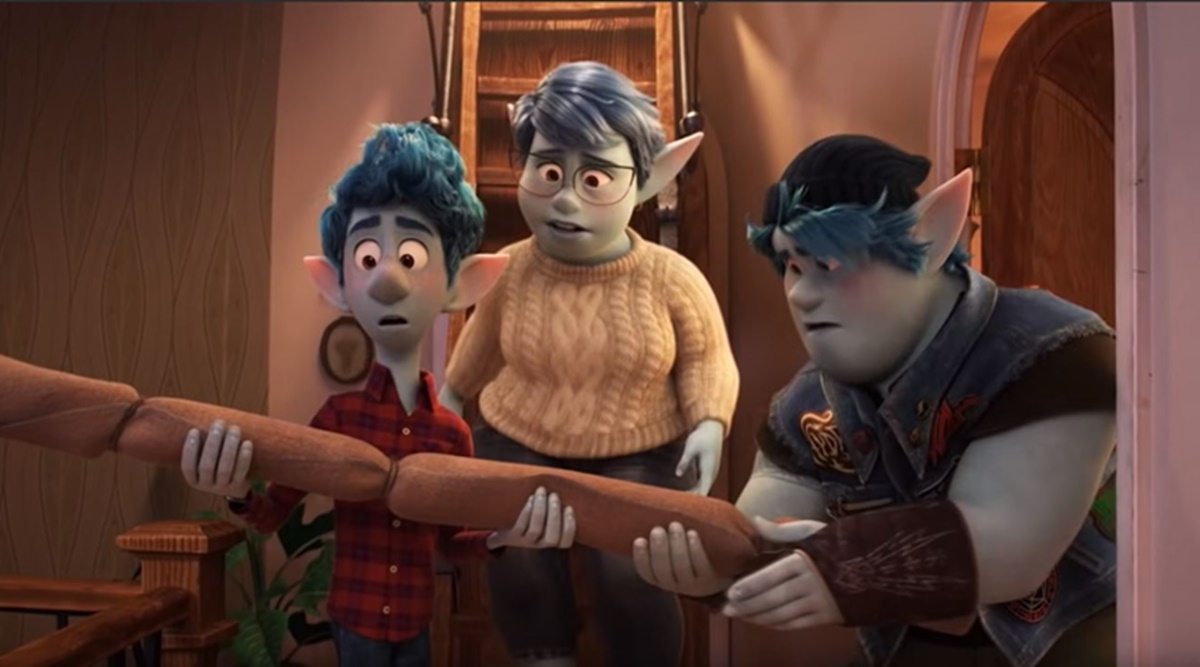The Walt Disney Company as a whole seems to be in constant danger of being overtaken by its own cannibalistic tendency--cashing in on the successes of their past hits at the expense of creating the kinds of stories that merited these reimaginings to begin with.
Pixar, coming fresh off a decade marked by a deluge of sequels, is certainly susceptible to this pattern as well. Though movies like Inside Out and Coco have helped breathe necessary life into the studio, audiences invested in the creative lifeblood of the studio should take note when an opportunity comes for either Disney or Pixar animation to flex their creative muscles.
This year we'll have three such opportunities between the two studios. [EDIT: Okay, maybe not. Thanks, Corona.] The first of these, ONWARD directed by Dan Scanlon, opens this weekend and paints a hopeful picture of a future where Pixar allows empathetic and novel storytelling to guide its output.
The film imagines a world where fantasy creatures like elves and centaurs not only exist but have also lost touch with their magical roots. This is a world where pixies ride motorcycles instead of fly. It is in this world where elf brothers Ian and Barley Lightfoot discover a magic spell that will allow them to spend one day with their father who died before Ian was born. The spell goes awry, and Ian and Barley embark on a quest like those of old to uncover a new source of magic that will let them finally see their dad again.
ONWARD isn't the first film to play around with blending the fantasy genre with a modern setting, much in the same way Zootopia wasn't the first talking animal movie, but like Zootopia, this film is insightful in how it uses this blending to feed organically into its theme: what does it mean when a world where dragons and elves have lost interest in magic looks exactly like our world? What would motivate someone to try to bring that magic back? How would that person have to grow?
The contemporary-fantasy quest that results boasts a wide vocabulary of obstacles. Ian and Barley will have to overpower both magical curses and low gas to claim their treasure. Sometimes the juxtaposition is funny, sometimes it's awesome, but always it's clever. One of the most dire sequences in the film, for example, comes down to whether or not Ian can successfully merge onto the freeway.
ONWARD isn't the first film to play around with blending the fantasy genre with a modern setting, much in the same way Zootopia wasn't the first talking animal movie, but like Zootopia, this film is insightful in how it uses this blending to feed organically into its theme: what does it mean when a world where dragons and elves have lost interest in magic looks exactly like our world? What would motivate someone to try to bring that magic back? How would that person have to grow?
The contemporary-fantasy quest that results boasts a wide vocabulary of obstacles. Ian and Barley will have to overpower both magical curses and low gas to claim their treasure. Sometimes the juxtaposition is funny, sometimes it's awesome, but always it's clever. One of the most dire sequences in the film, for example, comes down to whether or not Ian can successfully merge onto the freeway.
What's interesting isn't that the film pulls it off, but that it does so in a way that doesn't conflict with the tone of the grand and glorious quest Ian and Barely have embarked on. The successful genre blending yields tremendous rewards that echo in every other facet of the filmmaking.
The animation isn't as picturesque or ornate as Coco or Frozen II, but the visuals delight in other, unexpected ways. The designs are rich with creativity, especially as it pertains to the characters. I don't know how many aspiring artists grow up hoping they get to design a middle-aged manticore who's just trying to keep her investors happy, but the finished product can only be called a labor of love. Viewers can expect this degree of thoughtful design for even background characters such as Ian's classmates who look more like high schoolers than anything you'd find in Narnia or Middle-Earth.
Tom Holland and Chris Pratt as our leads works even better than it sounds. Somehow Holland and Pratt deliver the full force of their charisma without their overwhelming star persona ever intruding onto their performances or the audience's investment in the story. Ian and Barley never feel like sock puppets through which the voices of Tom Holland and Chris Pratt emanate, as is often the case where stars of such high-profile lead an animated film. They never feel like anything other than Ian and Barley. Holland and Pratt are joined by Julia Louis-Dreyfuss and Octavia Spencer lending their vocal talents to Laurel Lightfoot and The Manticore with equal grace. Holland and Pratt's dynamic translates onto the characters and forms the bedrock for the signature Pixar heart.
Scanlon's deeply personal film faces the tremendous task of delivering closure for proportionally personal aching. How does one tell a child how to come to terms with never knowing his or her parent? Somehow, the film finds an answer that will resonate deeply even for audiences who can't themselves enact any kind of resurrection spell, but it feels no less magical for it.
Pixar's reign of sequels over the last decade is in many ways a sign of victory, proof that the stories and characters the company produces demand to be revisited, yet this movie reminds us that the studio is at its best when we expand the family of worlds and characters under the Pixar umbrella. Perhaps this movie can serve as a guiding post for what to expect from Pete Doctor and Jennifer Lee recently taking over the reins for Pixar and Walt Disney Animation. Hopefully their approach will employ more of ONWARD's creative and affecting storytelling and not a second ONWARD film.
The animation isn't as picturesque or ornate as Coco or Frozen II, but the visuals delight in other, unexpected ways. The designs are rich with creativity, especially as it pertains to the characters. I don't know how many aspiring artists grow up hoping they get to design a middle-aged manticore who's just trying to keep her investors happy, but the finished product can only be called a labor of love. Viewers can expect this degree of thoughtful design for even background characters such as Ian's classmates who look more like high schoolers than anything you'd find in Narnia or Middle-Earth.
Tom Holland and Chris Pratt as our leads works even better than it sounds. Somehow Holland and Pratt deliver the full force of their charisma without their overwhelming star persona ever intruding onto their performances or the audience's investment in the story. Ian and Barley never feel like sock puppets through which the voices of Tom Holland and Chris Pratt emanate, as is often the case where stars of such high-profile lead an animated film. They never feel like anything other than Ian and Barley. Holland and Pratt are joined by Julia Louis-Dreyfuss and Octavia Spencer lending their vocal talents to Laurel Lightfoot and The Manticore with equal grace. Holland and Pratt's dynamic translates onto the characters and forms the bedrock for the signature Pixar heart.
Scanlon's deeply personal film faces the tremendous task of delivering closure for proportionally personal aching. How does one tell a child how to come to terms with never knowing his or her parent? Somehow, the film finds an answer that will resonate deeply even for audiences who can't themselves enact any kind of resurrection spell, but it feels no less magical for it.
Pixar's reign of sequels over the last decade is in many ways a sign of victory, proof that the stories and characters the company produces demand to be revisited, yet this movie reminds us that the studio is at its best when we expand the family of worlds and characters under the Pixar umbrella. Perhaps this movie can serve as a guiding post for what to expect from Pete Doctor and Jennifer Lee recently taking over the reins for Pixar and Walt Disney Animation. Hopefully their approach will employ more of ONWARD's creative and affecting storytelling and not a second ONWARD film.




Comments
Post a Comment